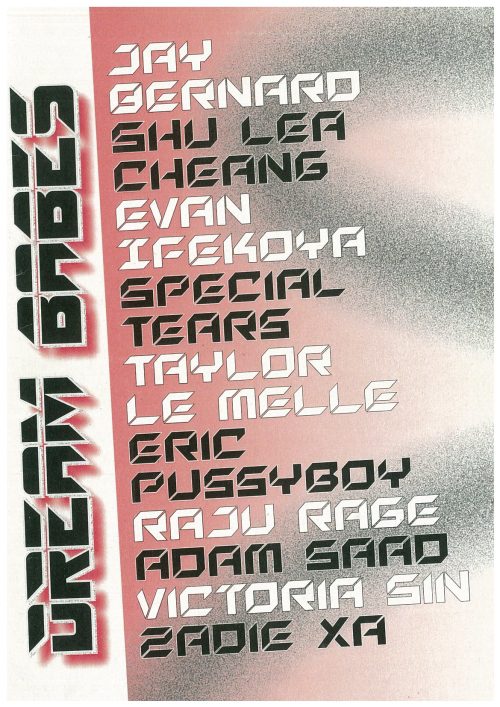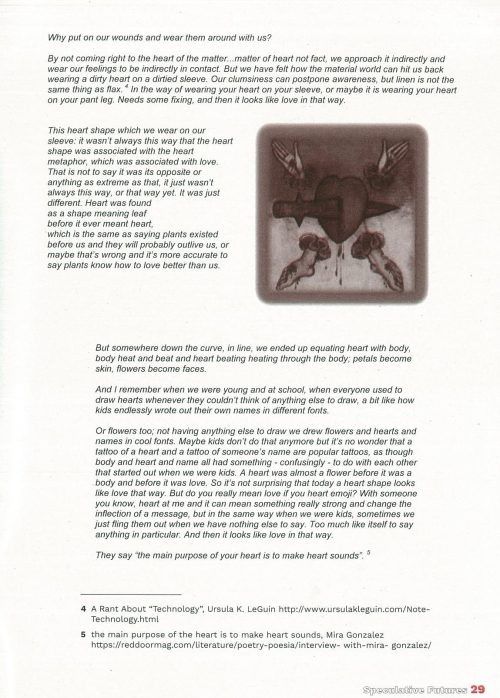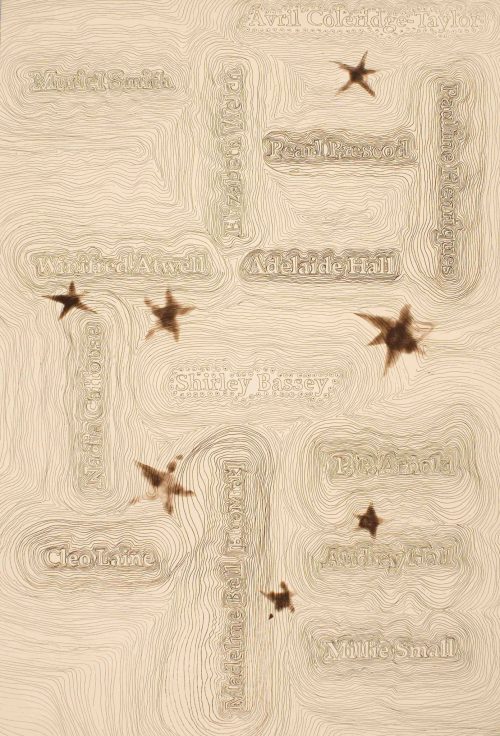William Gore speaks with Chloe Austin, Curatorial Trainee about his experience volunteering at Stuart Hall Library. He shares his top picks from the library and his plans to use the library in future projects.

Dream Babes: Issue 1, front page. Edited by Victoria Sin, design by Rowan Powell.
Chloe Austin: Can you tell me about the work you have been doing in the Stuart Hall Library?
William Gore: I’ve been updating the library’s bibliography of Stuart Hall’s work, making it more comprehensive by reference to the Stuart Hall Foundation’s extensive list. I’ve also helped with some relabelling of periodicals.
CA: Does this link to research you have undertaken outside of the library?
WG: During my course, I became increasingly interested in cultural studies, particularly relating to music and youth culture. Working on the Stuart Hall bibliography has exposed me to a lot of writing on these topics – including his writing on calypso and auditory culture. Just being in the library every week has also exposed me to so much amazing work!

Victoria Sin and Evan Ifekoya in Dream Babes: Issue 1, page 3
CA: To prep for this interview I asked you to bring something from the library collection to highlight, what have you brought and could you share some excerpts?
“On her back with her feet up she’d stomp on the
ceiling so much that the bar manager
had to repaint it almost every week
In those moments she could barely remember
She knows she felt euphoria
Upside down on the bar with her feet on
That ceiling and the rest of her flying
She felt weightless”
WG:

Special Tears (Cassandre Greenberg and Christopher Kirubi) in Dream Babes Issue 1, page 29
Dream Babes is a zine exploring speculative fiction and the possibilities of collectively imagining and experiencing moments outside and against oppressive social structures. It includes work by Jay Bernard, Shu Lea Cheang, Evan Ifekoya, Special Tears, Taylor Le Melle, Eric Pussyboy, Raju Rage, Adam Saad, Victoria Sin and Zadie Xa. When I first started volunteering it was on display at the reception and every time I walked in I was like ‘That’s a really cool cover.’ It’s an amazing zine, and the artists, poets and filmmakers featured make such great work.
“The physical experience of the body, always modified by the social categories through which it is known, sustains a particular view of society.” Mary Douglas, Natural Symbols: Explorations in Cosmology 1970, quoted in Dream Babes Issue 1

Sonia Boyce, Hard ground, soft ground and spitbite etching on Pescia Magnani paper, 2006, Publication March 2007, 30 x 20 inches, Image courtesy of Sonia Boyce, © Sonia Boyce
It’s definitely inspiring to read as a volunteer because at uni I wrote a lot on (particularly LGBTQ+) club culture as a collectively experienced (but often troubled) ‘utopia’, and the extent to which this might have political and personal impact, and reading a zine which engages creatively and critically with related questions in such a powerful way makes me want to get even more into these artists’ work and maybe try and explore these themes myself in some small way.
“This heart shape which we wear on our sleeve: it wasn’t always this way that the heart shape was associated with the heart metaphor, which was associated with love. That is not to say it was its opposite or anything as extreme as that, it just wasn’t always this way, or that way yet. It was just different…
But somewhere down the curve, in line, we ended up equating heart with body, body heat and beat and heart beating heating through the body; petals become skin, flowers become faces…
They say “the main purpose of your heart is to make heart sounds”.” Special Tears (Cassandre Greenberg & Christopher Kirubi) in Dream Babes Issue 1
CA: How has your perception of the collection changed since you’ve been volunteering?
WG: Since I’m no longer in higher education or academia, I’d thought I’d missed my chance to make the most of the library, but there’s so much here and it’s so easily accessible and friendly that I think it has loads of value for anyone, in academia or not. Looking forward to digging even deeper into the collection!
CA: Has the library collection influenced you outside of your volunteer hours?
WG: Being here has exposed me to the work of Sonia Boyce (through reading, and sitting underneath one of her works while reorganising the bibliography). ‘For you, only you’ was really inspiring to me as a way to combine different musical/vocal practices, and overlaps with some interests I have in works which combine classical motifs and electronic music. I’m hoping to explore more of the critical and creative work in the collection relating to music and technology to get some inspiration for some projects that I’ve been imagining since graduating.
CA: What kind of projects are you working on?
WG: I’m not super sure yet what they’ll be! I’m learning to DJ and trying to get some experience in events and sound tech so that I can try and put on some interesting club nights. I’m also trying to think of cool ways to combine visuals with DJ mixes and upload them online. It’s very early days though!
CA: Any last thoughts?
WG: I think if you’re like me and just looking to be exposed to a rich variety of work, visiting the library and aimlessly looking around at all the incredible books, journals and zines is a sure-fire way to come across something amazing.
_______________________________
William Gore graduated from the University of Cambridge with a degree in English, writing his dissertation on LGBTQ+ Dance Club Culture and Contemporary Poetry. He now works in music and is interested in cultural studies, club culture, poetry and the overlaps between them.